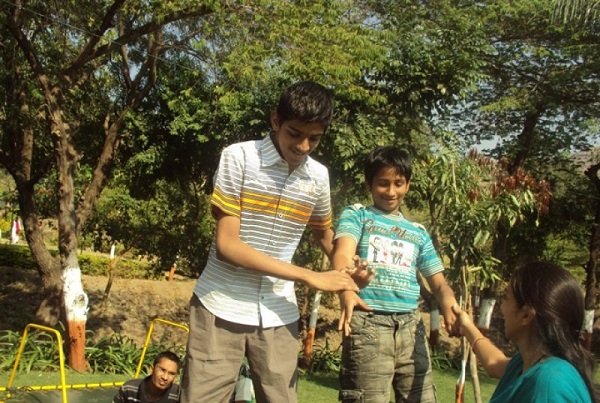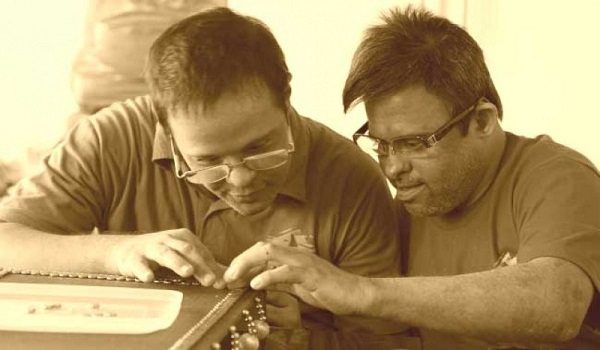Slowing down and taking stock of your emotions as the parent of an autism spectrum child will give you perspective.
 by Kamini Lakhani | saiconnections01@gmail.com
by Kamini Lakhani | saiconnections01@gmail.com
Part 10 of the Autism Diaries – Take a step back and slow down to engage better.
The days that I test out hypotheses with my students (most of whom are on the Autism Spectrum), are the best days of my life. Maybe, it’s the challenge that they present to me, which I thrive on. I also know that I will leave school that day happier and wiser!
So a couple of weeks ago, I had a session with Rakesh, a 20-year-old, who is non vocal and very smart. It was difficult to get him to engage with me. I had to really slow down the ball play between us to get him to continue with his role. At one point, he left the framework and made himself comfortable on a chair. I tried to invite him back to the interaction, but I could see that he was tense and had started to peel the skin from his fingers! I went up to him and said, “Listen, you can trust me. I will not push you over the edge”. He looked up at me and smiled his naughty smile. Wonder of wonders, he got up without protest! ‘That was not difficult’, I thought to myself.
The session ended without further event and I moved onto my next session with a mother of a 15-year-old who is integrated in a regular school. This family has been practicing RDI for many years and have experienced the benefit of the program to a great extent. What presents more of a challenge is the ADHD that the youngster also displays. We started to talk about the videos submitted and the work the mother had done with him that week.
She made a remark that struck me. She said she knows her framework is successful when she gets a studying response from her son! That made a lot of sense. A studying response is the result of slowing down substantially so that you can be mentally engaged with somebody else. For a person whose mind and body work at a feverish pace (due to the ADHD), this spells a slowing down of all systems of the body, to create moments of connection with another person. How profound!
Fast forward one week down the line. I found myself calling a friend and asking her if she and I could plan a trip out of town for a day. I suggested that we drive out to Pune and meet up with another friend, spend the day amongst ourselves and then head back at night. My condition though, was that we would not talk about autism. Being a fellow mom, she understood and we both laughed about it.
friend, spend the day amongst ourselves and then head back at night. My condition though, was that we would not talk about autism. Being a fellow mom, she understood and we both laughed about it.
I was feeling saturated and overwhelmed. I wanted time away from routine and my work, my family, basically everything. Of course, there is nothing wrong in wanting time out. I believe that everyone needs to spend time away from routine. When you’re away from a situation, you can see it more clearly.
But something was gnawing at me – this was different.
I had just finished with a tough term at school, I was overworked. Normally in situations like this, I look forward to spending time at home with family. Why was I trying to leave this time? Much as I tried to figure it out, I couldn’t quite get it. So, I tried to apply the advice that I give to parents facing overwhelming situations:
Face your emotions
Just experience what you are going through. Feel it deeply. If you are angry, just feel it without trying to change or rationalise the feeling. Spend some time alone.
Do not judge yourself
Be kind to yourself. Do not judge yourself for the feelings that you are experiencing. What you are facing as a parent is truly difficult. There is no need to feel guilty. Embrace yourself. Accept what you are going through.
Clear the clutter
Life moves at a frantic speed. What is truly important? You could get involved in a hundred things. But what is it that you really want? What is your most authentic role? What is it that ‘only you’ can do?
Somewhere along the line, we need to cut out things that are not that important and focus on what is really important. Prioritisation. Cut out the clutter. Simplify.
I quickly made a list of things that I needed to cut out.
After about an hour, I really felt much better. I messaged my friend saying that I did not feel the need to ‘get away’ anymore. Wow! I thought, ‘What works for my students, also works for me.’
Slow down…to speed up (a phrase that Dr Gutstein uses frequently).
See www.rdiconnect.com for more information about Relationship Development Intervention.
Being in a better frame of mind, I sit down to view Rakesh’s videos and type out his report. I see myself telling him, I’m not going to push you over the edge. He smiles his beautiful smile.
Is it because he knew that I was about to be pushed over the edge?
Have you experienced the effects of ‘slowing down’? Do you have questions about ASD? I would love to hear from you. Feel free to send me an email at saiconnections01@gmail.com.
Kamini Lakhani is the founder of SAI Connections. She is a Behaviour Analyst, an RDI (Relationship Development Intervention) Consultant, Supervisor and Trainer responsible for RDI professional training in India and the Middle East. She is the mother of an adult on the Autism Spectrum. She is also a member of Forum for Autism.
(Pictures courtesy www.we4autism.org, www.empowher.com. Images are used for representational purpose only)





I think this is among the most significant information for me.
And i’m glad reading your article. But should remark on few general things, The website
style is great, the articles is really excellent : D.
Good job, cheers
hi!,I really like your writing very much! share we keep in touch extra about your post on AOL?
I need an expert on this space to unravel my problem.
May be that is you! Looking forward to see you.